UnitPlanningfortheweekend
牛津小学英语UNIT 6 Planning for the weekend课件

take part in
a sports meeting
/’kɒntest / a sports meeting
/spɔ:ts/
a singing contest
take part in
a sports meeting
Let’s make our plan!
take part in a concert
My for the I plan am going to weekend! this weekend.
或存在的状态,常与表示将来的时间状语 this weekend. tomorrow. 连用。如:tomorrow, next week/ month/…,this Saturday/Sunday/ weekend/…,等。 动词原形
Dear Grandma:
are going to visit I’m very glad that you _____________ weekend It’s warm here. (拜访) me this weekend. Saturday I am going to have a picnic This Saturday, ____________________ (去野餐) and ___________( take photos 拍照). There is a concert in our school this Sunday Sunday. I am going to play the piano 弹钢琴). My friend ____________________( _____________________( is going to play the violin 拉小提琴).At the are going to see a play 看一场 concert we ___________________( 演出),too. I hope you will come soon.
Unit6 planning for the weekend

Unit6 planning for the weekend一、教学内容:6B. Unit 6 A部分,Listen, read and say二、教学目标:知识目标:①四会掌握:plan,play,take part in,have school②三会掌握:concert,Beijing opera ,singing contest, outing, sports meeting, by the way③听懂.会说和交际用语:is that gaoshan? Y es,please. By the way技能目标:1/能正确理解并初步掌握A部分会话。
情感目标:培养学生的小组合作意识,同时增强学生做事的计划性。
三、教学重、难点:能正确理解、掌握A部分会话,并能熟练朗读、表演会话。
四、课前准备:1 准备录音机和本课会话的磁带。
2 准备本课会话的投影片。
3 多媒体课件五、教学过程:Step1 Organization1.Warming up1)学唱歌曲: Will you join me?2)Everyday English(S→Ss)2.Free talk:A telephone call师生以打电话的形式自由交谈,渗透Is that ...?Y es, speaking.用Do you like...? Can you ... ?What do you do on ...? 等句子谈论各自的爱好所能,为引出本课内容Do you like volleyball? Can you swim? What do you do onSunday afternoon?做好准备。
在师生自由交谈中,引出打电话形式,学习Is that ...?的答句Y es, speaking.并适时运用一般将来时。
如:T: Do you like basketball?S: Y es, I do.T: I like basketball, too. I'm going to play basketball this afternoon.Step2 Presentation and practice教师可将课文分为两个部分教授。
小学英语六年级Unit 6 Planning for the weekend英文教案附教学反思

教学内容:Unit 6 Planning for the weekend (A)教学目标:1.能正确理解文章,并能朗读表演对话。
2.能听得懂、会说、会读和会写词汇plan, Beijing opera, concert, have school, plans/ planning for the weekend, see a Beijing opera, at the concert等。
3.能初步掌握句型What is/ are … going to do? …is/ are going to …4.能初步掌握日常交际用语Would you like to join me / come (to…) ? Shall we meet…?及答语。
教学重点:1.能正确理解文章,并能朗读表演对话。
2.能掌握词汇、句型和日常交际用语。
教学难点:引导学生理解感受“一般将来时”be going to do结构并初步运用该句型结构。
教学准备:1.教学课件。
2.录音机和磁带。
3.板书准备:David和Gao Shan 的头像。
对话气泡。
Step 1 Prepare for the classT:Boys and girls, are you ready?Ss: Yes!T: Shall we start our English lesson now?Ss: Yes!/ OK!T: Now, we are having an English lesson. What are we going to do at the English lesson? Guess! Try to be Miss Li. You can say ‘We are/ I’m going to …’T: Let’s read the senten ces.(板书:What are you going to do…? We are/ I’m going to…)S1: We are going to…S2: We are going to ...S3: We are going to ...S4: We are going to …T: Maybe we are going to… I think you are all good English teachers. Look! This is myT: Look! What are we going to do at first?S: We are going to play a guessing game.T: Would you like to join me?Ss: Yes!T: So you can say ‘Yes, I’d love to.’Ss: Yes, I’d love to.T: Look! What is Garfield going to do? Guess!S: (Perhaps/ Maybe) he/ it is going to …T: … is right. So you can ask the next question.S: What are Mrs Shen and the children going to do?S’: (Perhaps/Maybe) they’re going to …T: Look! What is the girl going to do? Look, she has two special masks. She likes …Ss: Beijing opera. (Teach: Beijing opera)T: What is she going to do?S: She is going to … (Teach: see a Beijing opera)T: Yes, you are right./ Sorry, you’re wrong.Teach: see a Beijing opera.T: What is the handsome man going to do? Guess! Who is he?S: He is Lang Lang.T: What is he good at?S: He’s good at playing the piano.T: What is he going to do?S1: He’s going to … S2: He’s going to …Teach: He is going to play the piano at the concert.concert – at the concertT: What is David going to do? Guess!S: He’s going to …(Show the picture) He is going to make a telephone call.T: You did a good job.Step 2 IntroductionT: Who is David calling? Let’s listen. (听引言)T: Who is David calling?S: He is calling Gao Shan.T: That’s right. Now let’s look, listen and repeat.T: What does ‘have school ’mean? Can you explain it in English?S: It means have classes.T: Pay attention to “plan”.Teach: plan – plans for the weekend – Unit 6 Planning for the weekendT: Let’s read the sentences by yourselves.T: Look at the pictures and try to say the sentences by yourselves.You can help each other.It is ____ on _____ morning. It is _____ and _____. The children _____ ______ have school today. David is ______ Gao Shan. They are talking about their _____ for the weekend.T: Let’s read it together.Step 3 Part OneT: What are David and Gao Shan going to do on Saturday afternoon?(课件显示) Let’s listen! (听第一段)S: They are going to see a Beijng opera.T: Beijing opera is very famous in the world.T: Look! David is calling Gao Shan.(电话响)[贴头像David, Gao Shan] The telephone is ringing.What is Gao Shan going to say?S: Hello.T: What about David?S: Hello. Is that Gao Shan?T: David?S: Yes, speaking.T: Good. Please practice in pairs. One is Gao Shan. The other is David.Back to back. OK?(学生两人练习电话用语。
Unit 6 Planning for the weekend
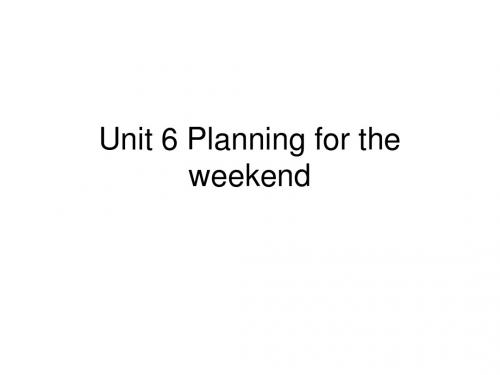
• By the way • What is David going to do tomorrow ?
What is David going to do tomorrow?
• I’m going to play the violin.
• • • • • •
Who is David’s sister? She is Nancy . What is Nancy going to do tomorrow? She is going to play the piano. Would Gao Shan like to come? Of course. He will come with Wang Bing ,Liu Tao and Yang Ling . • That’s good.
• It is 8:30 on Saturday morning .It is warm and sunny .The children do not have school today .David is calling Gao Shan .They are talking about their plans for the weekend .
Read and write
• 男孩们是正在想关于他们的周日计划。 • The boys are thinking about their plans for Sunday. • 我的表弟是正在做木偶。 • My cousin is making puppets. • 我是将要参加运动会。 • I am going to take part in the sports meeting. • 在晴朗的日子举行野餐它是很美的。。 • It is nice to have a picnic on a sunny day. • 我将要去看一个短剧这个周五晚上。 • I will go to see a short play this Friday evening. 今天晚上我的叔叔是将要看京剧。
Unit6《Planningfortheweekend》教学设计[学习资料]
![Unit6《Planningfortheweekend》教学设计[学习资料]](https://img.taocdn.com/s3/m/f36d1473ad02de80d4d8404e.png)
Unit6《Planningfortheweekend》教学设计一.目标与要求1.掌握课文出现的新语言点:have school, plan for the weekend, at the concert,2.掌握并会运用句型:What are you going to do…? I’m going to …3.能理解并能正确的使用电话用语Is that…?Yes, speaking。
4.能正确理解、掌握对话的内容,初步掌握制定计划的方法,并能有感情的朗读对话。
5.培养学生对时态的敏感性,能进一步了解并感知一般将来时。
二. 教学重难点1.重点:能听懂、会说、会读本课词汇,理解运用本课句型,能正确理解、掌握对话的内容并能流利的朗读对话。
2.难点:单词plan, concert的读音;有感情的朗读对话并适当拓展。
三. 教学准备:多媒体课件,词组与句型卡片四、主要板书设计Unit 6 Planning for the weekendWho A:What are you going to do …?What to do B:I am going to …with … .Make a planWith whom Would you like to join us?Where A:Yes, I’d love to. /Yes, I’d like to.Whenhave school plans for the weekend at the concert五、教学过程Step1.Warm up1. Exchange greetings.2. Free talkWhat is your favourite subject?Do you have any hobbies? Etc.Step2.Presentation(pre-reading)1.课件出示四月份日历a. What day is it today? What’s the date today?b. What did you do last weekend? Did you have a good time?(课件显示上周末日期)c. Because at the weekend we don’t have school, we are free, we can do many things we want to do. But where are you these days?(课件显示4月份工作日)These days we are busy, we have school.(教学have school)d. What are you going to do this weekend?(课件出示本周末日期)e. 根据学生的回答总结:…… is your plan for the weekend.(教学plans for the weekend)f. Do want to know what I am going to do this weekend? You can ask me .Ss: What are you going to do this weekend?T: I am going to fly a kite with my friend in the park this Sunday.(课件出示)So if we want to decide what to do this weekend, first we can make a plan. But how to make a plan?根据课件上I am going to fly a kite with my daughter in the park this Sunday.帮助学生整理;WhoWhat to doMake a planWith whomWhereWhen。
牛津6BUnit6Planningfortheweekend
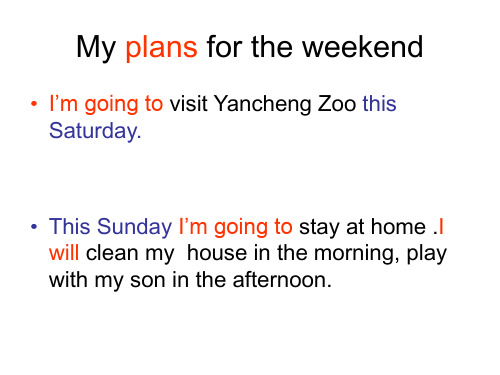
• I’m going to visit Yancheng Zoo this Saturday.
• This Sunday I’m going to stay at home .I will clean my house in the morning, play with my son in the afternoon.
.
concert 音乐会
Plans for the weekend
Who
Activities
(be going to )
Where
Gao Shan and David
When
(Saturday/ Sunday)
David
Nancy
Plans for the weekend
Who
Activities
(are/is going to)
GaoShan, and David
see a Beijing opera
David
play the violin at the concert
Where
in the Garden Theatre in the school
When
Saturday afternoon
• It is on
.
• It is
.
• The children
today.
• David is
Gao Shan.
• They are
.
What are they going to do today? What are they going to do tomorrow?
On Saturday What is Gaoshan going to do today?
Unit6Planning for the weekend

picture picnic have a picnic
pick
What are you going to do … ? I’m going to … .
My plan for the weekends
I’m going to … .
Let’s talk
There’s a concert in our school.
将要,打算
We‘re going to … weekend.
this
Group work
My plan for the weekends
I’m going to go to the… .
On the farm
What are you going to do ?
We are going to … .
Let’s talk
See an opera, see a play. Let’s go rowing in the bay. Take part, take part, Take part in. Take part in a sports meeting. Go on an outing, go camping. Happy weekends, how funny!
越溪实验小学运动会参赛证
Name
Li Yu qin
Item running race
__is going to take part in__. __will take part in__.
越溪实验小学运动会参赛证
Name
Li Yu qin
Itemswimming contest
__is going to take part in__. __will take part in__.
6B Unit 6 Planning for the weekend评课稿

6B Unit 6 Planning for the weekend评课稿
评6BUnit6Planningfortheweekend
“Planningfortheweekend”是牛津小学英语6BUnit6的内容,本单元围绕“周末活动计划”这个话题开展各项活动,本节课结合句型Whatarewegoingtodo……?及We’regoingto…….为重点内容学习B部分的单词及第二、第三人称的问答句,李老师能结合学生的实际情况进行教学设计,有以下优点:
一、教学步骤紧凑、自然,条理清晰。
先由谈论自己的周末活动引出课题,接着谈论学生的周末引出Whatareyou\wegoingtodo……?再由图片引出Whatishe\shegoingtodo……?及Whataretheygoingtodo……?的教学,最后再归纳小结语法,让学生编对话等。
二、注重学生兴趣的培养,充分发挥信息技术多媒体的作用。
在教学seeaBeijingOpera这个词组前,教师先让学生欣赏一段京剧,让学生在紧张的学习中放松一下,同时也加深了学生对这个词的印象,提高了学生学习的兴趣。
三、巩固形式多样。
游戏是学生最喜欢的活动,教师在巩固新知时,用了多种形式的游戏,如:巩固词组时,让一名学做动作,其余学生猜词组,在操练句型时,教师有意遮住图片的一部分,让学生猜,学生乐于接受,兴趣很高。
俗话说:人无完人。
同样,课也没有十全十美的课。
“周末活动计划”是学生乐于讨论的话题,语言的交际性和实用性比较强,教师如果能为学生创设一个真实的情景,让学生在真实的情景中学会交际,那就更好了,同时,在操练复数句型时,最好让两个或两个以上学生进行操练,这样就更能体现操。
【英语教案】6B Unit 6 planning for the weekend教案及教学反思

【英语教案】6B Unit 6 planning for the weekend教案及教学反思Unit6 Planning for the weekend课型新授课本课题教时数:6 本教时为第1教时备课日期:4月2日目标:一、知识与技能:1、能听懂、会说、会读和会拼写单词have a picnic, go on an outing, see a play, see a Beijing opera, take part in a singing contest, take part in a sports eeting.2、能听懂、会说、会读和会写句型What are you going to do ...? I' going to ...二、过程与方法:能够初步掌握一般将时,并进行日常问答。
三、情感态度与价值观:通过学习本单元的内容,学生能够计划自己的周末生活,丰富周末生活。
教学重点、难点:1、能够掌握、并运用B部分的词组;2、能够运用一般将时进行日常问答。
教学方法与手段:多媒体,单词及句型卡片等。
教学过程:教师活动学生活动设计意图Step 1 War up and lead in1. The greeting2. Free talk与随班生进行简单的对话交流。
What day is it today?What’s the weather like today?What do you usually do at the weekend? What did you last weekend?Step2 RevisionHave a revision on soe phrases, like:fly a kite, go for a walk, watch a gae and so on.Step3 Presentation1. You can do any things at the weekend. Which season is it now? What can you do in winter?Which season coes after winter?What’s the weather like in spring?What can you do in spring…?Now I’ going to give you soe suggestions. aybe you can go out and take soething to eat with you when it is sunny this weekend.That eans you can have a picnic.Teach the phrase: have a picnic.Teach go on an outing in the sae way.2. It is spring no I think you should do soe outdoor activities. Think it over, what are you going to do this weekend? (Write down be going to on the blackboard. )Teach the sentence: What are you going to do this weekend?3. T: Next I' going to show you soe beautiful pictures.Teach: see a play, see a Beijing opera拓展:see a fil, see a puppet show/ an anial sho.. 鼓励随班生一起读这些词组。
如何做周末计划英语作文
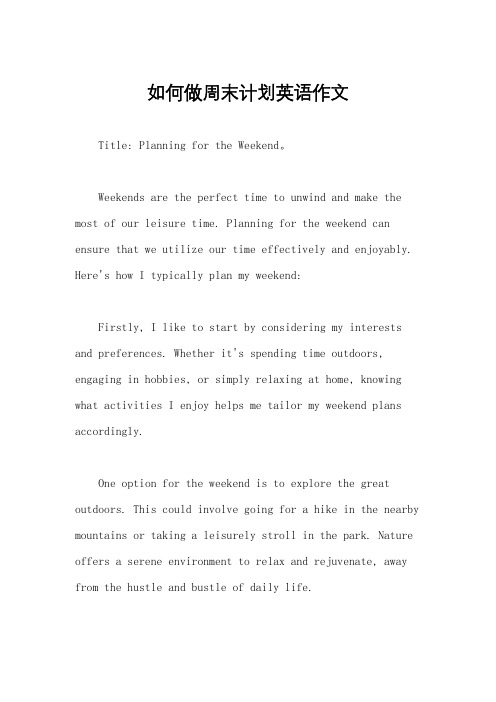
如何做周末计划英语作文Title: Planning for the Weekend。
Weekends are the perfect time to unwind and make the most of our leisure time. Planning for the weekend can ensure that we utilize our time effectively and enjoyably. Here's how I typically plan my weekend:Firstly, I like to start by considering my interests and preferences. Whether it's spending time outdoors, engaging in hobbies, or simply relaxing at home, knowing what activities I enjoy helps me tailor my weekend plans accordingly.One option for the weekend is to explore the great outdoors. This could involve going for a hike in the nearby mountains or taking a leisurely stroll in the park. Nature offers a serene environment to relax and rejuvenate, away from the hustle and bustle of daily life.Alternatively, I might opt for cultural activities such as visiting museums, art galleries, or attending a theater performance. These experiences not only provide entertainment but also enrich my knowledge and appreciation of art and culture.Another aspect of weekend planning involves socializing with friends and family. Whether it's organizing a gathering at home, going out for dinner, or attendingsocial events, spending time with loved ones is essential for maintaining relationships and fostering a sense of community.Moreover, weekends provide an opportunity to indulge in hobbies and interests that may be neglected during the weekdays. Whether it's painting, playing a musical instrument, or practicing photography, dedicating time to activities that bring joy and fulfillment is essential for overall well-being.In addition to leisure activities, I also allocate time for relaxation and self-care. This could involve practicingmindfulness, meditation, or simply unwinding with a good book or favorite TV show. Taking care of my mental and emotional health is just as important as engaging in physical activities.Furthermore, weekends are an ideal time to plan for the week ahead. This could include meal prepping, organizing tasks and priorities, and setting goals and objectives. By taking proactive steps to plan for the upcoming week, I can ensure a smooth transition from leisure time to work mode.Overall, effective weekend planning involves a balance of leisure, social, and productive activities. By considering my interests and priorities, I can create a weekend itinerary that maximizes enjoyment and relaxation while also preparing for the week ahead. Whether it's exploring nature, pursuing hobbies, or spending time with loved ones, weekends offer endless possibilities for rejuvenation and fulfillment.。
6BUnit6Planningfortheweekends

David: There’s a concert in the school
tomorrow afternoon. I’m going to play the violin.
Gao Shan: Great! Is Nancy going to play at the concert?
David: Sure. She’s going to play the piano. Would you like to come?
at the concert ?
Task 5: Read and answer
Learning tips: 同桌阅读课文(P.47), 找出问题答案并划出。
Gao Shan: By the way, what are you going to do
tomorrow?
David: There’s a concert in the school
Learning tips:
同学们,试着邀请你的同学一起参加你 精彩的五一活动吧!
What are you going to do on May Day?
Ask your friends their plans.
Name
May.1st
Plans May. 2nd
May. 3rd
call your friends and talk about your plan
(3)David is going to _p_la_y_t_h_e_v_i_o_li_n_ at the concert tomorrow. Nancy is going to _p_la_y__th_e__p_ia_n_o_ at the concert. Gao Shan would like to _w_a_t_ch_ the concert _w_it_h_ his friends.
planning for the weekend的教案及教学反思
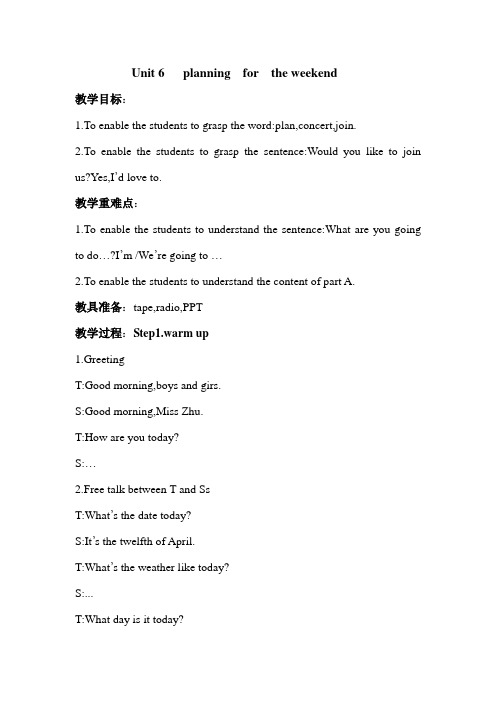
Unit 6 planning for the weekend教学目标:1.To enable the students to grasp the word:plan,concert,join.2.To enable the students to grasp the sentence:Would you like to join us?Yes,I’d love to.教学重难点:1.To enable the students to understand the sentence:What are you going to do…?I’m /We’re going to …2.To enable the students to understand the content of part A.教具准备:tape,radio,PPT教学过程:Step1.warm up1.GreetingT:Good morning,boys and girs.S:Good morning,Miss Zhu.T:How are you today?S:…2.Free talk between T and SsT:What’s the date today?S:It’s the twelfth of April.T:What’s the weather like today?S:...T:What day is it today?S:It’s Thursday.T:Oh,weekend is coming.I’m going to study in Pizhou.by the way.What are you going to do this weekend?teach“by the way”顺便问一下S:I’m going to…T:I’m going to…too.Shall we going to do it together?S:Ok.T:…We’re going to…would you like to join us?(encourage the students answer:)Yes,I’d love to.(PPT shows the sentence and read them.)Practice this sentence in groups.Step 2.Presentation and practice1.play a game:Look and guessPPT shows some vague pictures and encourage the students to guess.P1.A:what are they going to do this weekend?B:They’re going to see a Beijing Opera.P2.A:What’s she going to do this weekend?Is she going to…?B:Yes,she is/No,she isn’t.P3.A:What’s he going to do this weekend?B:He’s going to make a telephone call.T:Good!but can you guess who is he going to call?PPT shows the picture of David is calling Gao Shan.2.Listen to the tape.PPT shows a question .Ss listen to the tape and answer the question. Q:What are they talking about?A:They’re talking about their plans for the weekend.(teach the word:plan )3.Listen to the tape and finish the table.Step 3.Consolidation1.Listen to the tape and finish the exercises on the book.2.Read after the tape.3.Act the dialogue out.Step 4.Homework1.Listen to the tape and read after it.2.Make a plan for your family this May Day.Blackboard design:《Planning for the weekend 》教学反思本课教学6BUnit6Planning for the weekend Part A板块的内容,主要话题是谈论周末计划。
6BUnit6Planningfortheweekend教案表格式
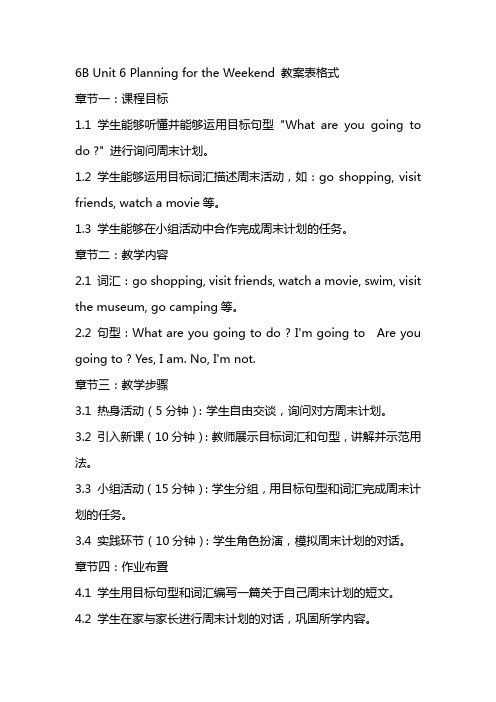
6B Unit 6 Planning for the Weekend 教案表格式章节一:课程目标1.1 学生能够听懂并能够运用目标句型"What are you going to do ?" 进行询问周末计划。
1.2 学生能够运用目标词汇描述周末活动,如:go shopping, visit friends, watch a movie等。
1.3 学生能够在小组活动中合作完成周末计划的任务。
章节二:教学内容2.1 词汇:go shopping, visit friends, watch a movie, swim, visit the museum, go camping等。
2.2 句型:What are you going to do ? I'm going to Are you going to ? Yes, I am. No, I'm not.章节三:教学步骤3.1 热身活动(5分钟):学生自由交谈,询问对方周末计划。
3.2 引入新课(10分钟):教师展示目标词汇和句型,讲解并示范用法。
3.3 小组活动(15分钟):学生分组,用目标句型和词汇完成周末计划的任务。
3.4 实践环节(10分钟):学生角色扮演,模拟周末计划的对话。
章节四:作业布置4.1 学生用目标句型和词汇编写一篇关于自己周末计划的短文。
4.2 学生在家与家长进行周末计划的对话,巩固所学内容。
章节五:教学评价5.1 课堂参与度:观察学生在小组活动和角色扮演中的参与情况。
5.2 语言运用准确性:评估学生在对话中运用目标句型和词汇的准确性。
5.3 作业完成情况:检查学生作业的完成质量。
章节六:教学资源6.1 课件或黑板,用于展示目标词汇和句型。
6.2 周末计划任务卡片,用于小组活动。
6.3 学生作业模板,用于编写短文。
章节七:教学注意事项7.1 确保学生能够听懂并正确运用目标句型。
7.2 鼓励学生积极参与小组活动和角色扮演。
- 1、下载文档前请自行甄别文档内容的完整性,平台不提供额外的编辑、内容补充、找答案等附加服务。
- 2、"仅部分预览"的文档,不可在线预览部分如存在完整性等问题,可反馈申请退款(可完整预览的文档不适用该条件!)。
- 3、如文档侵犯您的权益,请联系客服反馈,我们会尽快为您处理(人工客服工作时间:9:00-18:30)。
一教案内容:
1能听懂、会说和会读和会拼写单词:picnic , plan ,take part in ,play
2能听懂、会说和会读单词contest ,Beijing opera show ,singing contest ,sports meeting
教师讲解在进行时和一般将来时两者的区别或者就让学生说说两者有什么明显的区别.
2用以上方法教案前四副图.
3看图,师引导学生对话,学习give a puppet show .
Look at this picture . What is he going to do this evening ?
He is going to give a puppet show .
三教案重点和难点:会用本课句型为自己的周末计划一下。
四课前准备:录音机,小黑板
五教案过程
教案环节
教师活动
学生活动
A Revision
教师先将歌曲磁带放两遍,学生欣赏感受歌曲的旋律。1.学生朗读单词,了解歌词大意,再放录音跟唱。2.还可边配合做动作。活跃课堂气氛。
B Presentation
一、指导学生先观察图片,简要介绍对话背景,让学生了解对话主题,预测可能听到的内容,做好听的心理准备。1.教师播放全文录音,鼓励学生养成整体接受语言材料的习惯,指导学生在听的过程中完成填空练习。2.教师与学生共同讨论练习答案,分析错误原因,找到解决方法。二、教师先引导学生自己阅读本课的语言材料,大致理解句子意思,想像活动场景。1.学生在课上阅读本材料之前,先给本部分的生词注好意思,你可以通过上下文猜测,也可借助课文插图理解词意,或者直接查工具书。2.学生阅读对话,选择合适的图片,完成本部分阅读练习。
六板书设计:
Unit 6
Is that Gao Shan ?
Yes , speaking .
七作业设计:
1翻译词组。
周末计划2、去年3、在教室前面4、上课5、加入他们
2回答问题。
What day is it today ?
What date is it today ?
Would you like to see a Beijing opera show ?
2、同桌以电话的形式来段小对话。
B Presentation
根据学生学习水平及能力,采用看图听录音的方法引入课文,让学生对引言部分有整体的理解。
出示课文图片,学生边观察边听录音理解引言部分内容。
在讨论中学习plan .
回答问题。
Who are they ?What day is it today ?What is David doing ?
会熟练使用日常交际用语:Is that Gao Shan ? Yes , speaking .
四课前准备:录音机
五教案过程
教案环节
教师活动
学生活动
A Revision
1、师生以电话的形式自由对话。谈谈天气、学习情况等等。
-Hello.-Hello. Is that Gao Yu?
-Yes ,this is Gao Yu. -Today is sunny . Did you finish you homework ?-Yes ,I did .-Let’s go to the park .-Great .
Unit 6 Planning for the weekend (第二教时)
一教案内容:
1能听懂、会说、会读和会拼写单词:plan.
2能听懂、会说和会读单词:still , concert , Beijing opera show ,singing contest
3能听懂、会说和会熟练使用日常交际用语:Is that Gao Shan ? Yes , speaking .
3、能听懂、会说和会读单词:concert .
二教案目标:
1、能听懂、会说和会读日常交际用主By the way , what are you going to do …?
2、能听懂、会说、会读和会写句型What are we going to do …? We’re going to …能听懂、会说和会读单词:concert .
Hello , is that …? Sorry , you’ve got the wrong number .
学生间互相使用电话用语进行小对话。
B Presentation
教师将课文图片设计成David, Nancy各自单独的图片。
学生观察图片,听录音、完成以下表格。
Who
When
Activities
3能听懂、会说、会读和会写句型:What are we going to do…?We are going to…
三教案重点和难点:
What are we going to do…?We are going to…句型进行对话.
四课前准备:录音机,挂图
五教案过程
教案环节
教师活动
学生活动
A Free talk
三教案重点和难点:
能听懂、会说、会读和会写句型What are we going to do …? We’re going to …并能准确使用主语不同,be动词也不同。
四课前准备:录音机,打好小表格。
五教案过程
教案环节
教师活动
学生活动
A Revision
师生使用电话用语进行对话。
May I speak to …?Hello , is …in ?
B Presentation
1呈现B小图片,have a picnic
师生通过对话区别现在进行时和一般将来时.
Look ,what are they doing ?
They are having a picnic .
Do you like having a picnic ?
Yes ,I do .
we’re going to have a picnic this Sunday .
3、“假日小队”活动评比。以小队为单位,设计安排小队假日一天的集体活动,各小队用英语向全班说明其设计方案。通过评比,选出最喜欢的小队活动方案。
4、要求学生运用What are you going to do ? And how ?以打电话形式,了解亲朋好友的出行方式,并作好对话记录。
六板书设计:
What is she /he going to do ?
二教案目标:
1能听懂、会说和会读单词project , zebra , Africa , elephant ,.了解字母组合ow在单词中的读音。
2能唱歌曲Would you like to join us ?能熟练使用句子What are we going to do ?We’re going to…
Unit 6 Planning for the weekend (第三教时)
一教案内容:
1、能听懂、会说和会读日常交际用主By the way , what are you going to do …?
2、能听懂、会说、会读和会写句型What are we going to do …? We’re going to …
3抄写单词和词组。
八教案反思
本课继续围绕主要句型教授A部分的课文,在本课中主要采用了打电话的方式来邀请别人或者询问别人将去做某事,实际上由于本课非常贴近生活实际,同时在平时学生也会经常邀请自己的同学或朋友去做某事,所以在教授中就给了教师一个很好的生活环境创设,何时何地见面或者如何来邀请等句型就自然地呈现给学生,利于学生的掌握。
3能听懂、会说、会读和会写句型:What are we going to do…?We are going to…
二教案目标:
1能听懂、会说和会读和会拼写单词:picnic , plan ,take part in ,play
2能听懂、会说和会读单词contest ,Beijing opera show ,singing contest ,sports meeting
二教案目标:
1能听懂、会说、会读和会拼写单词:plan.
2能听懂、会说和会读单词:still , concert , Beijing opera show ,singing contest
3能听懂、会说和会熟练使用日常交际用语:Is that Gao Shan ? Yes , speaking .
三教案重点和难点:
She /He is going to …
七作业设计:
一、判断下列单词是否含有相同的语音。
blouse house ( ) mouse out ( ) nice right ( ) hotel on ( )
二、翻译词组
1、在音乐会上2、举行音乐会3、和王兵一起来4、by the way 5、在花园剧院之前
3回答问题
1.What are we going to do this Saturday ?
2.Do you like having a picnic ?
3.Which season do you like best ? Why ?
八教案反思
本课围绕“周末活动计划”这个话题开展各项活动,所涉及的日常交际工程有介绍、打电话、询问和建议等,其中以询问What are we going to do…?及We’re going to…为重点内容。其中“周末活动计划”是学生乐于讨论的话题,语言的交际性和实用性也都比较强,所以教师可以尽量结合学生实际情况,创设既符合儿童心理特征又比较自然的活动情景,让学生在情景中学会交际,在交际中学会语言。
Where
在教案中逐渐呈现、教授concert .
在理解课文的基础上,学生可以就课文内容互相提问。
